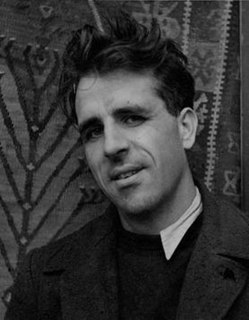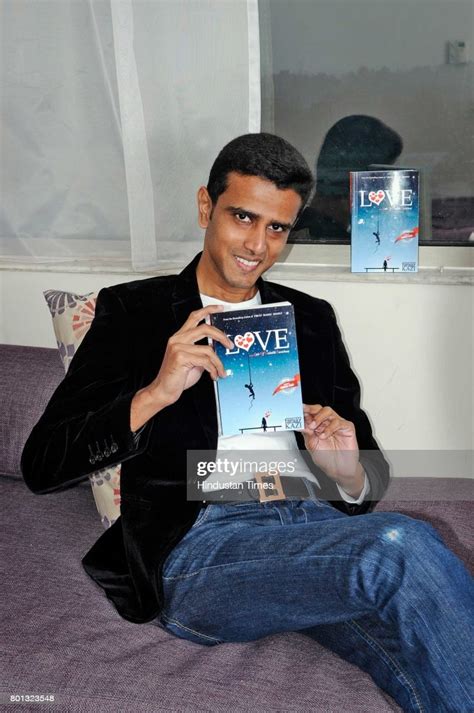A Quote by Ludwig von Mises
He who accepts life for what it is and never allows himself to be overwhelmed by it does not need to seek refuge for his crushed self-confidence in the solace of a 'saving lie'. If the longed-for success is not forthcoming, if the vicissitudes of fate destroy in the twinkling of an eye what had to be painstakingly built up by years of hard work, then he simply multiplies his exertions. He can look disaster in the eye without despairing.
Related Quotes
When he at least reached the door the handle had cease to vibrate. Lowering himself suddenly to his knees he placed his head and the vagaries of his left eye (which was for ever trying to dash up and down the vertical surface of the door), he was able by dint of concentration to observe, within three inches of his keyholed eye, an eye which was not his, being not only of a different colour to his own iron marble, but being, which is more convincing, on the other side of the door.
According to true military art, one should never push one's enemy to the point of despair, because such a state multiplies his strength and increases his courage which had already been crushed and failing, and because there is no better remedy for the health of beaten and overwhelmed men than the absence of all hope.
If the artist does not fling himself, without reflecting, into his work, as Curtis flung himself into the yawning gulf, as the soldier flings himself into the enemy's trenches, and if, once in this crater, he does not work like a miner on whom the walls of his gallery have fallen in; if he contemplates difficulties instead of overcoming them one by one ... he is simply looking on at the suicide of his own talent.
At one o’clock, the ever-logical Right-Eye Grand Steward woke up to discover that during his sleep his left-eyed counterpart had executed three of his advisors for treason, ordered the creation of a new carp pool and banned limericks. Worse still, no progress had been made in tracking down the Kleptomancer, and of the two people believed to be his accomplices, both had been released from prison and one had been appointed food taster. Right-Eye was not amused. He had known for centuries that he could trust nobody but himself. Now he was seriously starting to wonder about himself.
From the root, the sap rises up into the artist, flows through him, flows to his eye. Overwhelmed and activated by the force of the current, he conveys his vision into his work. And yet, standing at his appointed place as the trunk of the tree, he does nothing other than gather and pass on what rises from the depths. He neither serves nor commands he transmits. His position is humble. And the beauty at the crown is not his own; it has merely passed through him.
The young man who addresses himself in stern earnest to organizing his life-his habits, his associations, his reading, his study, his work-stands far more chance of rising to a position affording him opportunity to exercise his organizing abilities than the fellow who dawdles along without chart or compass, without plan or purpose, without self-improvement and self-discipline.
Organizations aren't loyal; they can't be. They have to be nimble, they have to change. That means everybody in every organization will have one eye on his or her own brand, and the other eye on the organization of which he or she is a part. And the first loyalty - self-loyalty - is becoming more and more dominant, simply as a survival strategy. I'm in no way blaming anyone here; this is just simply a fact of life.
The fact that labour is external to the worker, i.e., it does not belong to his intrinsic nature; that in his work, therefore he does not affirm himself but denies himself, does not feel content but unhappy, does not develop freely his physical and mental energy but mortifies his body and his mind. The worker therefore only feels himself outside his work, and in his work feels outside himself.
Whether he sleeps or wakes,--whether he runs or walks,--whether he uses a microscope or a telescope, or his naked eye,--a man never discovers anything, never overtakes anything, or leaves anything behind, but himself. Whatever he says or does, he merely reports himself. If he is in love, he loves; if he is in heaven, he enjoys; if he is in hell, he suffers. It is his condition that determines his locality.
He'd gone to Louddon's fortress to take Madelyne captive. His plan was revenge; an eye for an eye. And that had been reason enough. Until she'd warmed his feet. Everything had changed at that moment. Duncan had known with a certainty he couldn't deny that they were henceforth bound together. He could never let her go.
Fate, they say, fate- the clay that molds the events of your life, and it was the same fate that had thrown the stone of her heart on the building of his expectations. But then wasn't it his fault that he had constructed the building of glass? Hadn't he failed to cement the bricks of his love with trust and colour them with security? There was no insurance for broken hearts, no ointment for wounded souls and there would never be one, he knew.
His face set in grim determination, Richard slogged ahead, his fingers reaching up to touch the tooth under his shirt. Loneliness, deeper than he had never known, sagged his shoulders. All his friends were lost to him. He knew now that his life was not his own. It belonged to his duty, to his task. He was the Seeker. Nothing more. Nothing less. Not his own man, but a pawn to be used by others. A tool, same as his sword, to help others, that they might have the life he had only glimpsed for a twinkling. He was no different from the dark things in the boundary. A bringer of death.




































